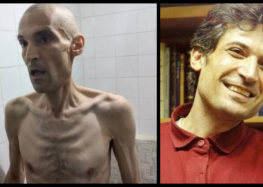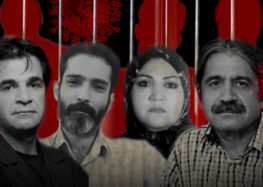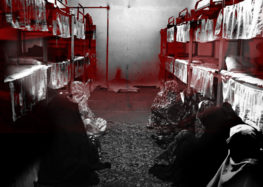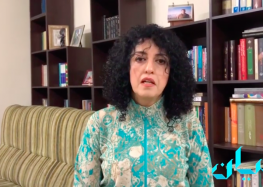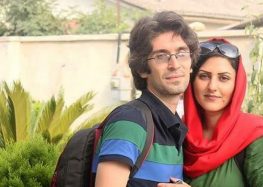Man Imprisoned for Protesting Compulsory Hijab Punished by New Evin Prison Director
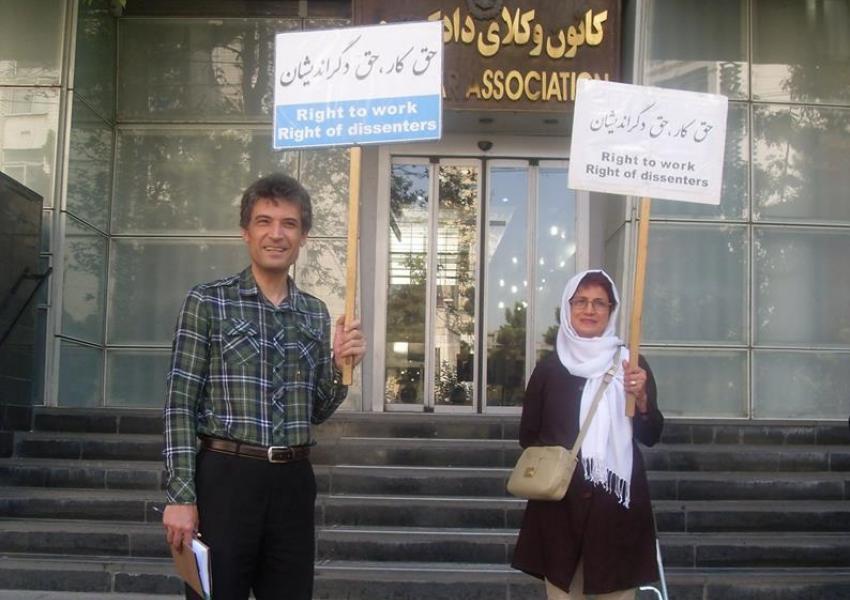
Farhad Meysami at a protest in Tehran beside current political prisoner and human rights attorney, Nasrin Sotoudeh.
Imprisoned civil rights activist Farhad Meysami was transferred from Evin Prison in Tehran to Rajaee Shahr Prison in Karaj (west of the capital) on November 9, 2019, as punishment for launching a peaceful protest, the Center for Human Rights in Iran (CHRI) has learned.
“After taking him away, Evin Prison officials gathered his personal belongings in Ward 4 and refused to answer his cellmates’ questions,” a source with contacts inside the prison told CHRI on the condition of anonymity.
The transfer to Rajaee Shahr, known for its harsh living conditions, took place two days after Evin Prison’s new hardline director Gholamreza Ziaei banned Meysami and fellow prisoner of conscience Mohammad Habibi (Meysami’s cellmate) from receiving visitors in response to their recent protest, which several other political prisoners inside the facility joined, the source said.
On October 8, 2019, Meysami and Habibi signed an open letter declaring their refusal to abide by “arbitrary rules” instituted by Ziaei restricting prisoners’ rights to visits with their families and associates.
The “arbitrary rules” include limits on phone calls, visitation rights and a ban on receiving books and publications.
“Given the numerous flagrant violations of prison regulations and other laws regarding the rights of prisoners, as well as the prison director’s refusal to respond to prisoners’ repeated requests to discuss matters, from now on we will not feel obliged to comply with your arbitrary rules,” the letter said.
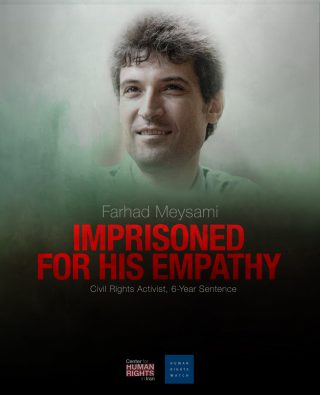 To date, at least 13 other political prisoners have joined the protest in Evin Prison: Hossein Sarlak, Morteza Nazari Sedehi, Aliasghar Hassani-Rad, Reza Aghaie, Mohsen Aminpour, Hamed Aynehvand, Hamed Gholami, Mehdi Astarzaie, Milad Rami, Vahid Ghadirzadeh, Mehdi Meskin-Navaz, Taher Haji Ghorbani, Barzan Mohammadi, and Peyman Jamshidiha.
To date, at least 13 other political prisoners have joined the protest in Evin Prison: Hossein Sarlak, Morteza Nazari Sedehi, Aliasghar Hassani-Rad, Reza Aghaie, Mohsen Aminpour, Hamed Aynehvand, Hamed Gholami, Mehdi Astarzaie, Milad Rami, Vahid Ghadirzadeh, Mehdi Meskin-Navaz, Taher Haji Ghorbani, Barzan Mohammadi, and Peyman Jamshidiha.
“Evin Prison officials and judicial authorities have refused to meet and talk with Meysami and Mohammadi,” the source told CHRI. “Instead, they reacted by imposing more limits and banning family visitations to force them to stop their civil disobedience.”
Meysami and Habibi’s relatives were turned away twice at Evin Prison in late October and early November 2019.
“Mohammadi [first name unknown], the head of security at Evin Prison, met with Habibi today [November 10] and offered to agree to his demands in return for ending the protest,” reported the Supporters of Mohammad Habibi channel on the Telegram messaging app.
It added: “Habibi responded that he would be willing to stop his civil disobedience if his demands were met and prisoners’ rights were respected, but his first pre-condition is the return of Farhad Meysami from [Rajaee Shahr] to Evin Prison. The security official rejected the pre-condition and threatened to send Habibi there, too, and open a new criminal case against him.”
In January 2019, Meysami, a medical doctor, was sentenced to six years imprisonment and banned from leaving the country or engaging in online activities for two years for peacefully protesting the country’s compulsory hijab law. In August 2019, the Appeals Court confirmed Meysami’s prison sentence and reduced the two-year ban on his online activities to one year, according to his lawyer Mohammad Moghimi.
For peacefully promoting a woman’s right to choose whether or not to wear a hijab, Meysami was convicted of “assembly and collusion against national security” and “propaganda against the state” at Branch 15 of the Revolutionary Court in Tehran presided by Judge Abolqasem Salavati.
In December 2018, the Appeals Court upheld a 10.5-year prison sentence (of which he must serve 7.5) issued in August 2018 against Habibi, a teacher and member of the Iranian Teachers’ Trade Association (ITTA). He was also sentenced to 74 lashes as well as two years abstinence from political and social activities and prohibited from leaving the country for two years. It’s not clear whether the lashing sentence was carried out.
Habibi was convicted of “assembly and collusion against national security,” “propaganda against the state” and “disturbing public order.”
Read this article in Persian.

